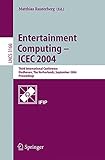Entertainment Computing – ICEC 2004 [electronic resource] : Third International Conference, Eindhoven, The Netherlands, September 1-3, 2004. Proceedings / edited by Matthias Rauterberg.
Material type: TextSeries: Lecture Notes in Computer Science ; 3166Publisher: Berlin, Heidelberg : Springer Berlin Heidelberg, 2004Description: XXIII, 617 p. online resourceContent type: text Media type: computer Carrier type: online resourceISBN: 9783540286431Subject(s): Computer science | Information systems | Multimedia systems | Artificial intelligence | Computer Science | User Interfaces and Human Computer Interaction | Information Systems Applications (incl.Internet) | Multimedia Information Systems | Artificial Intelligence (incl. Robotics) | Computer Appl. in Arts and Humanities | Personal ComputingAdditional physical formats: Printed edition:: No titleDDC classification: 005.437 | 4.019 LOC classification: QA76.9.U83QA76.9.H85Online resources: Click here to access online
TextSeries: Lecture Notes in Computer Science ; 3166Publisher: Berlin, Heidelberg : Springer Berlin Heidelberg, 2004Description: XXIII, 617 p. online resourceContent type: text Media type: computer Carrier type: online resourceISBN: 9783540286431Subject(s): Computer science | Information systems | Multimedia systems | Artificial intelligence | Computer Science | User Interfaces and Human Computer Interaction | Information Systems Applications (incl.Internet) | Multimedia Information Systems | Artificial Intelligence (incl. Robotics) | Computer Appl. in Arts and Humanities | Personal ComputingAdditional physical formats: Printed edition:: No titleDDC classification: 005.437 | 4.019 LOC classification: QA76.9.U83QA76.9.H85Online resources: Click here to access online  E-BOOKS
E-BOOKS
| Current library | Home library | Call number | Materials specified | URL | Status | Date due | Barcode |
|---|---|---|---|---|---|---|---|
| IMSc Library | IMSc Library | Link to resource | Available | EBK3306 |
Invited Presentations -- Advanced Interaction Design -- Art, Design, and Media -- Augmented, Virtual, and Mixed Reality -- Computer Games -- Human Factors of Games -- Intelligent Games -- Mobile Entertainment -- Sound and Music -- Visual Media Engineering.
The advancement of information and communication technologies (ICT) has enabled broad use of ICT and facilitated the use of ICT in the private and personal domain. ICT-related industries are directing their business targets to home applications. Among these applications, entertainment will differentiate ICT applications in the private and personal market from the of?ce. Comprehensive research and development on ICT - plications for entertainment will be different for the promotion of ICT use in the home and other places for leisure. So far engineering research and development on enterta- ment has never been really established in the academic communities. On the other hand entertainment-related industries such as the video and computer game industries have been growing rapidly in the last 10 years, and today the entertainment computing bu- ness outperforms the turnover of the movie industry. Entertainment robots are drawing theattentionofyoungpeople. TheeventcalledRoboCuphasbeenincreasingthenumber of participants year by year. Entertainment technologies cover a broad range of pr- ucts and services: movies, music, TV (including upcoming interactive TV), VCR, VoD (including music on demand), computer games, game consoles, video arcades, g- bling machines, the Internet (e. g. , chat rooms, board and card games, MUD), intelligent toys, edutainment, simulations, sport, theme parks, virtual reality, and upcoming service robots. The?eldofentertainmentcomputingfocusesonusers’growinguseofentertainment technologies at work, in school and at home, and the impact of this technology on their behavior. Nearly every working and living place has computers, and over two-thirds of childreninindustrializedcountrieshavecomputersintheirhomesaswell.


There are no comments on this title.